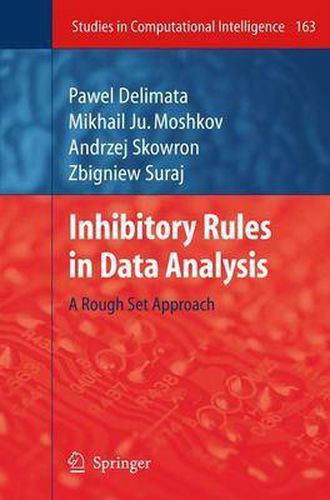Readings Newsletter
Become a Readings Member to make your shopping experience even easier.
Sign in or sign up for free!
You’re not far away from qualifying for FREE standard shipping within Australia
You’ve qualified for FREE standard shipping within Australia
The cart is loading…






This title is printed to order. This book may have been self-published. If so, we cannot guarantee the quality of the content. In the main most books will have gone through the editing process however some may not. We therefore suggest that you be aware of this before ordering this book. If in doubt check either the author or publisher’s details as we are unable to accept any returns unless they are faulty. Please contact us if you have any questions.
This monograph is devoted to theoretical and experimental study of inhibitory decision and association rules. Inhibitory rules contain on the right-hand side a relation of the kind attribut = value . The use of inhibitory rules instead of deterministic (standard) ones allows us to describe more completely infor- tion encoded in decision or information systems and to design classi?ers of high quality. The mostimportantfeatureofthis monographis thatit includesanadvanced mathematical analysis of problems on inhibitory rules. We consider algorithms for construction of inhibitory rules, bounds on minimal complexity of inhibitory rules, and algorithms for construction of the set of all minimal inhibitory rules. We also discuss results of experiments with standard and lazy classi?ers based on inhibitory rules. These results show that inhibitory decision and association rules can be used in data mining and knowledge discovery both for knowledge representation and for prediction. Inhibitory rules can be also used under the analysis and design of concurrent systems. The results obtained in the monograph can be useful for researchers in such areas as machine learning, data mining and knowledge discovery, especially for those who are working in rough set theory, test theory, and logical analysis of data (LAD). The monograph can be used under the creation of courses for graduate students and for Ph.D. studies. TheauthorsofthisbookextendanexpressionofgratitudetoProfessorJanusz Kacprzyk, to Dr. Thomas Ditzinger and to the Studies in Computational Int- ligence sta? at Springer for their support in making this book possible.
$9.00 standard shipping within Australia
FREE standard shipping within Australia for orders over $100.00
Express & International shipping calculated at checkout
Stock availability can be subject to change without notice. We recommend calling the shop or contacting our online team to check availability of low stock items. Please see our Shopping Online page for more details.
This title is printed to order. This book may have been self-published. If so, we cannot guarantee the quality of the content. In the main most books will have gone through the editing process however some may not. We therefore suggest that you be aware of this before ordering this book. If in doubt check either the author or publisher’s details as we are unable to accept any returns unless they are faulty. Please contact us if you have any questions.
This monograph is devoted to theoretical and experimental study of inhibitory decision and association rules. Inhibitory rules contain on the right-hand side a relation of the kind attribut = value . The use of inhibitory rules instead of deterministic (standard) ones allows us to describe more completely infor- tion encoded in decision or information systems and to design classi?ers of high quality. The mostimportantfeatureofthis monographis thatit includesanadvanced mathematical analysis of problems on inhibitory rules. We consider algorithms for construction of inhibitory rules, bounds on minimal complexity of inhibitory rules, and algorithms for construction of the set of all minimal inhibitory rules. We also discuss results of experiments with standard and lazy classi?ers based on inhibitory rules. These results show that inhibitory decision and association rules can be used in data mining and knowledge discovery both for knowledge representation and for prediction. Inhibitory rules can be also used under the analysis and design of concurrent systems. The results obtained in the monograph can be useful for researchers in such areas as machine learning, data mining and knowledge discovery, especially for those who are working in rough set theory, test theory, and logical analysis of data (LAD). The monograph can be used under the creation of courses for graduate students and for Ph.D. studies. TheauthorsofthisbookextendanexpressionofgratitudetoProfessorJanusz Kacprzyk, to Dr. Thomas Ditzinger and to the Studies in Computational Int- ligence sta? at Springer for their support in making this book possible.